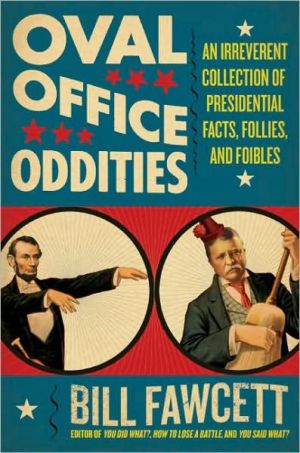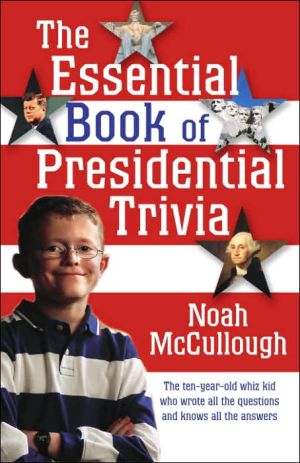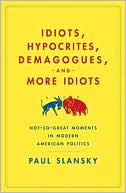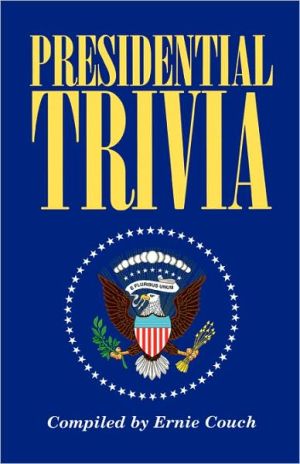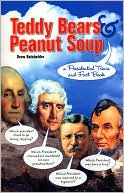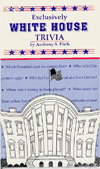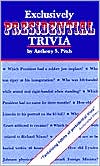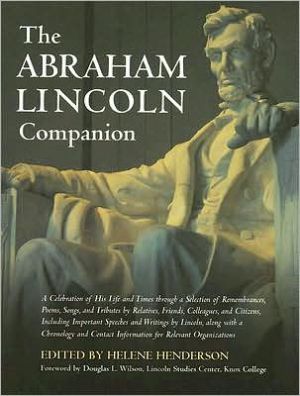Oval Office Oddities: An Irreverent Collection of Presidential Facts, Follies, and Foibles
Every four years Americans go to the polls to elect a leader—a personage of unimpeachable sobriety and moral standing who will serve as a paragon for the rest of us. But truth be told, presidents and their families are people too—with quirks and character flaws like everyone else . . . and plenty of skeletons rattling around in their closets. Oval Office Oddities is a grand compendium of fascinating, sometimes embarrassing presidential facts, gaffes, and oddball behaviors—available in plenty...
Search in google:
Every four years Americans go to the polls to elect a leader—a personage of unimpeachable sobriety and moral standing who will serve as a paragon for the rest of us. But truth be told, presidents and their families are people too—with quirks and character flaws like everyone else . . . and plenty of skeletons rattling around in their closets. Oval Office Oddities is a grand compendium of fascinating, sometimes embarrassing presidential facts, gaffes, and oddball behaviors—available in plenty of time for Election Day! White House Whoopee: We've all heard about the dalliances of Clinton and Kennedy—but what were Washington, Jefferson, FDR, and Ike doing behind closed doors? America's Imelda: Mary Todd Lincoln had an endearing little clothing fetish . . . and once purchased 300 pairs of gloves in a single month! Go West, Young Prez: "California Dreamin'" was not a top presidential priority . . . since no Commander in Chief bothered to visit the neglected coast until Rutherford B. Hayes did in 1880. Crazy Jack: Many prominent leaders were absolutely convinced that John Adams was stark raving bonkers! School Library Journal Adult/High School- This amusing collection of factoids entertains, but it's also an accessible look at the 43 men who have held our nation's highest office. The book presents offbeat information in digestible portions ranging from one sentence to a quarter page and frequently portrays our presidents as folks much like the rest of us. The history of America's early days is made relevant for modern readers through comparison with more recent events (e.g., parallels between controversial 19th-century elections and Bush vs. Gore). The comical black-and-white illustrations and caricatures, a table of each president's vital statistics (age at inauguration, dates served), and an appendix presenting tongue-in-cheek ratings of the best and worst presidents all give readers a chance to glean numerous nuggets worthy of trivia quizzes, including First Lady foibles, top scandals, assassinations and assassination attempts, and the story of Martin Van Buren's tiger cubs. Several key crises and presidential responses to them are given chapter-length coverage, as are particularly noteworthy presidents such as Thomas Jefferson and Theodore Roosevelt. This enjoyable book would be useful as a supplement to a history or civics curriculum, or for independent study by confirmed political junkies or those who have only become interested in presidential politics with the historic 2008 campaign.-Ed VanderPloeg, New London, NH
Oval Office Oddities\ An Irreverent Collection of Presidential Facts, Follies, and Foibles \ Chapter One\ A Field Guide to Past American Presidents, 1789 t0 1933\ A word of explanation on this first section is in order. The fact is that just about everyone reading this book already knows a lot about George Washington, Abraham Lincoln, FDR, JFK, and a few of the other most renowned presidents. But what do you know about Franklin Pierce? So, what follows is a crib sheet. Each president is listed and there is actually a bit more about the more obscure, often deservedly obscure, national leaders than those few with whom we are most familiar. If you are at a nice snobby party full of historians and pseudo-historians, keep this list handy and astound your fellow guests. It is rather unlikely they will contest a single insightful statement you make about Franklin Pierce or even the relatively recent William Howard Taft.\ George Washington 1789-1797\ George Washington started poor and ambitious, married for money, led the American Revolution and, almost single handedly, set the standard and pattern for all future presidents. He is also the first president to order American soldiers against other Americans to put down a revolt, a distinction only he and Abraham Lincoln, who led the entire nation in the Civil War, share.\ John Adams 1797-1801\ A revolutionary leader who distrusted the masses. John Adams was brilliant and one of the chief philosophical leaders of the new nation. He also was not very good at day-to-day politicking and was overwhelmed by infighting. Abigail Adams was one of the first true feminists to appear inthe nation, wife to one president and mother to another.\ Thomas Jefferson 1801-1809\ Almost certainly the most intelligent and creative man ever to hold the office. He was a renaissance man whose only real flaw was being a great host who entertained himself into poverty. He was also the president who made the Louisiana Purchase, which doubled the size of the nation and opened the continent. So much can be said about him that he has his own chapter in this book.\ James Madison 1809-1817\ An author and the chief supporter of the Constitution. He wrote extensively, helping to get the document accepted. He was analytical, cautious, and logical. His views on government molded the United States and are reflected in the nature of the nation even today.\ James Monroe 1817-1825\ President Monroe was the first of the "foreign policy presidents." He could be concerned with such things because matters were going smoothly inside the still-new nation. Perhaps his greatest accomplishment was the Monroe Doctrine, which basically told foreign powers to stay out of the Western Hemisphere. The irony of this is that it was mostly enforced by the British, who actually had a navy, not the United States, which really didn't.\ John Quincy Adams 1825-1829\ Son of John Adams, he spent sixty-six years in government ser-vice. He was a determined and skilled negotiator before becoming president, but somewhere along the way he lost his drive. His term was lackluster, and he failed to be reelected.\ Andrew Jackson 1829-1837\ The first of the -people's presidents, Jackson was from the then frontier state of Tennessee. He was rough-hewn, took offense easily, and was said to have fought, and survived, a hundred duels and certainly did fight more than most. He was against a central bank and other reforms we now take for granted. He was also the military hero of his day, having beaten both American Indians and then the British in battle. His victory at New Orleans energized the nation and helped restore its self-confidence.\ Martin Van Buren 1837-1841\ Van Buren was the campaign organizer who put Andrew Jackson into office. In repayment, Jackson named him his successor and that seems to have been enough to get him elected. Where Jackson was all rough edges and frontier attitudes, Van Buren was a politician full of street smarts. He had the misfortune to be president during one of the worst depressions in the nation's history, and though he did form the national bank, he failed to really deal with the problem. Jackson was a tough act to follow, and Van Buren was simply not equipped to do that.\ William Henry Harrison 1841\ He was the first candidate to run what we would recognize today as being an actual campaign for the presidency. Being the oldest president elected up to that time, he wanted to prove how robust he was by delivering his hour-long inaugural speech without wearing a coat on a very cold and damp day. He did, and the resulting illnesses killed him a month later.\ John Tyler 1841-1845\ Succeeded to the presidency when Harrison died. The program for replacing a dead president hadn't really been set, and by just taking the office and daring others to challenge him, Tyler settled what could have been a very messy issue. He was not popular with Congress and did not get many of his programs passed. He was the first president to have his veto overridden. He also actively helped to get Texas admitted as a state. Tyler was always troubled by the North-South split and once headed a peace commission, but eventually saw all efforts fail. He served as a senator for the Confederate States of America, where he was the only U.S. president to swear an oath to a nation at war with the United States.\ James Knox Polk 1845-1849\ This president was a strict Methodist who forbade drinking and dancing in the White House. He was a major force in the expansion of the United States through the addition of the western and southwestern portions of the continent to the still-young nation. The Mexican-American War was fought during his term. He was never very popular, but historians have been much kinder to his presidency than his contemporaries were.\ Zachary Taylor 1849-1850\ Win a war, get elected president. A good slogan helps, as it earlier did for General Harrison, who led the battle of Tippecanoe. Winning the Mexican-American War worked for Zachary Taylor, too, along with presidents from Washington to Eisenhower. Taylor was president for only sixteen months, much to the relief of the party that elected him. No one knew his politics when he was elected, and though he was from Virginia, he took an anti-slavery stand, bringing California in as a free state and upsetting the balance. His few months in office actually started the skid that ended with the American Civil War.\ Oval Office Oddities\ An Irreverent Collection of Presidential Facts, Follies, and Foibles. Copyright © by Bill Fawcett. Reprinted by permission of HarperCollins Publishers, Inc. All rights reserved. Available now wherever books are sold.
Introduction viiA Field Guide to Past American Presidents, 1789 to 1933 1Campaign Promises 11Presidential Firsts 31Presidential Peculiarities 46George Washington 65Before and After 72Thomas the Think Engine 83Presidents as People 92Grant me This 107Dignity, Always Dignity 115Body Politic 130Presidential Politics 148Left and Right ... 155When, Who, and How Much? 164On the Record: Presidential Libraries 177The Unsinkable Teddy Roosevelt 182Commander in Chief 198First Lady Follies 242Family can be First Family 263Stripes in the Stars 271Presidential Pets 276Presidential Pastimes 294Presidential Yachts 299Assassinations and Attempted Assassinations 309And the Other was Elected Vice President ... 315They said that? 323White House Wonders 327Rating the Presidents 339
\ School Library JournalAdult/High School- This amusing collection of factoids entertains, but it's also an accessible look at the 43 men who have held our nation's highest office. The book presents offbeat information in digestible portions ranging from one sentence to a quarter page and frequently portrays our presidents as folks much like the rest of us. The history of America's early days is made relevant for modern readers through comparison with more recent events (e.g., parallels between controversial 19th-century elections and Bush vs. Gore). The comical black-and-white illustrations and caricatures, a table of each president's vital statistics (age at inauguration, dates served), and an appendix presenting tongue-in-cheek ratings of the best and worst presidents all give readers a chance to glean numerous nuggets worthy of trivia quizzes, including First Lady foibles, top scandals, assassinations and assassination attempts, and the story of Martin Van Buren's tiger cubs. Several key crises and presidential responses to them are given chapter-length coverage, as are particularly noteworthy presidents such as Thomas Jefferson and Theodore Roosevelt. This enjoyable book would be useful as a supplement to a history or civics curriculum, or for independent study by confirmed political junkies or those who have only become interested in presidential politics with the historic 2008 campaign.-Ed VanderPloeg, New London, NH\ \ \
